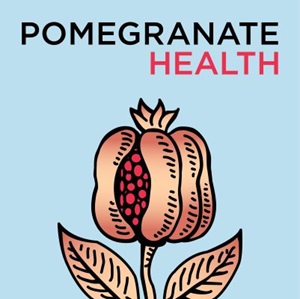Pomegranate Health
Welcome to Pomegranate Health — a podcast about the culture of medicine.

You'll hear insights from clinicians, researchers, and advocates as they tackle the most important questions — like how to make difficult clinical and ethical decisions without being influenced by bias, how to communicate better with patients and colleagues, and how to provide healthcare that’s both efficient and fair.
For a sampler of the varied themes of professional practice take a listen to Episode 132 and Episode 125.
If you're a Fellow of the RACP, time spent listening can be counted toward your CPD hours. And if you're a Basic Physician Trainee, the [Case Report] series can help you prepare for your long case clinical exams.
This is also the home of [IMJ On-Air], featuring authors from the Internal Medicine Journal sharing their latest research. Plus, the [Journal Club] episodes give RACP researchers a space to talk through their work published in other academic journals.
We’d love to hear your thoughts — feel free to leave a comment on each episode or send feedback and ideas to podcast@racp.edu.au.
Latest episodes
Ep61: Delirium Part 2- Prevention and Management
Delirium can be precipirated by a host of environmental triggers that are highly modifiable. Anything that contributes to a person’s disorientation and discomfort can increase the likelihood of a delirium episode. While a lot of these factors are compounded in elderly and frail patients, delirium can be reversed in a majority of patients by non-pharmacological means.
Ep60: Delirium Part 1- Detection and Causes
Delirium is an acute disturbance of consciousness, attention, cognition or perception. It’s associated with an increased risk of falls, dementia and high dependency care, and all of this adds up to higher mortality. About a third of patients admitted to ICU or approaching the end of life, experience delirium. But it’s notoriously underdiagnosed, so in this episode we talk about the presentations and detection of delirium. We also go through some of the medical and iatrogenic risk factors.
Ep59: Essential Ethics in Paediatrics
When can a child be said to have cognitive capacity and bodily autonomy? For those who don’t, where does the guardianship of the parent to give way to that of the medical professionals? These questions and more are discussed in two case studies from the Essential Ethics podcast, produced within the Children's Bioethics Centre in Melbourne.
Ep58: Billing Part 2—Compliance and the Free Market
Almost 500 million Medicare rebates are processed every year and for the most part these are claimed appropriately. But non-compliant billing could be costing the health system over 2 billion dollars annually. The vast majority of this comes down to lack of education about the MBS. Department of Health has an elaborate, and sometimes controversial way of identifying misuse of the system. Government regulation also influences the market for private medical fees as does supply and demand of certain specialties.
Ep57: The Art of Telehealth
COVID-19 has disrupted delivery of routine healthcare in many ways. Consulting patients by video or phone can be a way to keep patients safe, but many doctors are nervous as they adopt it for the first time. In this podcast we go over some of the bureaucratic and tech support questions that clinicians have been asking during the current crisis. We also discuss the art of building trust with new patients, and conducting a physical examination through telehealth.
Ep56: Billing in Byzantium
Australia has one of the best value health systems in the world, but also some of the most complicated health regulation that ties together public and private payers. This creates some traps for well-intentioned providers and loopholes for the less well-intentioned.
Ep55: Starting out in Private Practice
When doctors are starting out in private practice, they typically do so within the safety net of an established practice, and typically renting a room in exchange for an agreed portion of the consultation. The next levels of complexity involve setting up a business for oneself, or partnering in a group practice. In this podcast we discuss the personal and financial challenges, and also how to build awareness and trust in the community.
Ep54: My Health Record in Practice
Australia’s personal health record has been around for seven years, but it’s been hard getting health providers to upload data the MyHealth Record routinely. The uptake differs wildly between primary, secondary and tertiary care, so in this podcast we visit each of these settings and hear what the different expectations are of this new tool, what are the benefits gained, and how well it fits into the workflow of a consultation.
Ep53: Marrabinya—a hand outstretched
Marrabinya is a Wiradjuri word meaning “hand outstretched.” It’s the name of a service in the Western New South Wales Primary Health Network which financially supports Indigenous Australians to attend specialist consultaions. Aboriginal and Torres Strait Islander Peoples currently receive specialist medical care 40% less often than non-indigenous Australians. The Marrabinya staff explain how socioeconomic factors and institutional biases even in these settings can accumulate to prevent Aboriginal patients from receiving the care they need.
Ep52: Opioids Part 2- Regulation and Marketing
This episode looks at influencers of opioid prescribing. First we ask which are the opioids most commonly leading to dependence and why are they prescribed. Then we discuss the mixed messages that prescribers are getting from guidelines and pharmaceutical regulation, not to mention promotional campaigns by pharmaceutical companies. In Tasmania these influences have be countered by education, regulation and real-time prescription monitoring.